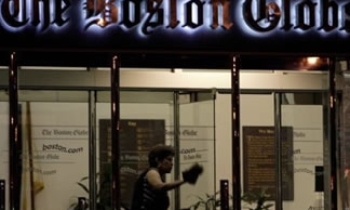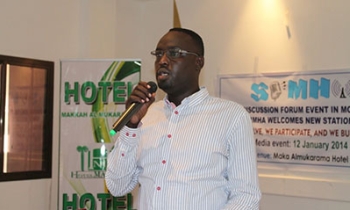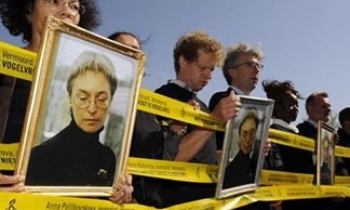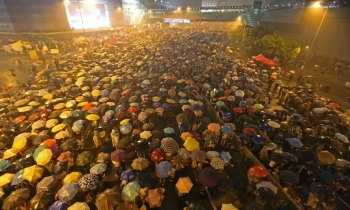Something doesn't add up about why Judith Miller went to jail. The New York Times reporter didn't write a story about the Valerie Plame case and had a waiver from her source in order to talk about it to the grand jury. But she insisted on going to jail anyway. Speculation is mounting that Miller is protecting herself─that Miller was herself a source of information about Plame that made it to several Bush administration officials and was then recycled to columnist Robert Novak. He, then, disclosed Plame's employment by the CIA and her role in arranging for her husband Joe Wilson's mission to Africa to investigate the Iraq-uranium link.
This would help explain why Miller didn't write a story about the case. It would be difficult for Miller to write a story when she was so deeply involved in how it developed. Disclosure of her role then or now would be extremely embarrassing.
Wilson had written a column for the Times bashing the administration's Iraq policy and it would have been natural for Miller to write something when Novak's column was published. But Miller didn't write anything. Why? Defenders of the Times have used this fact to allege that the special counsel, Patrick Fitzgerald, is out of control and that free-press rights are in danger. But there could be another explanation of Miller's behavior and why Fitzgerald wants her testimony. She could be the key to exonerating Bush administration officials of possible violations of the law against knowingly disclosing the identities of covert intelligence agents. If they were simply passing along information from Miller or some other journalist about Joseph Wilson's wife, then they can't be accused of deliberately disclosing classified information about Plame's identity.
The assumption all along has been that Miller is going to jail to protect a source. This doesn't make sense because her "source" provided a waiver, releasing Miller from any promise of confidentiality. These waivers have enabled several reporters to testify in the case. Why should Miller be any different, unless her relationship with her "source" is different? In other words, what if the "source" was an official who may have given some information to Miller but received some important information in return and then passed it on to others already questioned by Fitzgerald? This would explain why Miller, who didn't write a story, got dragged into the case.
The more likely explanation is that Miller is protecting private discussions with administration officials, and that during those discussions she provided or confirmed information about Plame's identity. This would make sense. Both Miller and Plame covered the subject of weapons of mass destruction and it was likely that they knew one another, or at least were aware of each other's work in this field.
This speculation may be unfair to Miller but it is fed by her silence and reports in the press. The Washington Post reported that "Sources close to the investigation say there is evidence in some instances that some reporters may have told government officials─not the other way around─that Wilson was married to Plame, a CIA employee."
What's abundantly clear, at the very least, is that the Times is caught in a major case of hypocrisy. The paper editorialized on December 31, 2003, in favor of Fitzgerald's investigation, on the grounds that it was imperative to find out "who violated federal law by giving the name of the undercover intelligence operative to Novak for publication in his column." But what if the name was provided to Novak by an administration official who got it from Miller?
In its editorial hailing the appointment of Fitzgerald, a "respected career prosecutor," the paper advocated that he exercise "true operational independence" and use the "full powers of a special counsel, including the ability to seek Congressional intervention if he finds his investigation blocked by a government official or agency."
Now, however, Fitzgerald finds his investigation blocked by the Times. The Times' curious position is that the paper wanted a special counsel investigation but doesn't want to cooperate with it. This shows how the probe has boomeranged on the Times. Initially, the Times believed that an inquiry would reveal some plot involving administration officials using the Novak column to damage Wilson by going after his wife. This is what many on the liberal-left suspected, and that is why then-Senate Democratic Leader Tom Daschle called for a special-counsel investigation.
Lately, however, the Times has been questioning whether there was a violation of the law in the first place. What explains this flip-flop on what seemed like such a clear-cut case? The explanation lies in the Times' acquired belief that Miller is deeply involved in this story, and not just in the sense of having gotten information from a source for a story she didn't write.
When that editorial was published, the Times was obviously unaware of Miller's possible role in providing information about Plame to the administration. But when she refused to testify about a story she didn't write and about a source who granted her a waiver of confidentiality, the Times must have feared the worst. The possible truth about her role could backfire not only on her but on the Times itself. So now the Times is engaging in a cover-up under the banner of protecting the First Amendment.
Turning the case upside down, Times executive editor Bill Keller insists, with a straight face, that, by going to jail, Miller is affirming the ability of the press to expose government cover-ups and wrongdoing. Keller charged that Miller's jailing is "likely to serve future cover-ups of information. Anybody who believes government should be aggressively watched feels a chill up their spine today." In fact, Miller is refusing to testify in a case that the Times said was about alleged criminal activity by government officials. By the Times own account, Miller is covering up for an official suspected of violating the law. This is why David Ignatius of the Washington Post wrote, in a column entitled, "Bad Case for a Fight," that "This is a case in which the sources weren't disclosing wrongdoing by others but were allegedly doing wrong themselves by blowing the cover of a CIA officer."
Still, Ignatius says he's "angry" that Miller is in jail. This reflects the "we are above the law" attitude taken by so many in the liberal press.
The Times' sophisticated public relations campaign, which also includes biased coverage in favor of federal shield laws to protect other Judith Millers, has convinced liberal Republican Senator Arlen Specter to hold emergency hearings on July 20 in front of his Senate Judiciary Committee about the need for new legislation to protect the press.
Before the Congress is stampeded into giving the press special rights and protections, our elected representatives need to know all the facts about the Valerie Plame case. If administration officials engaged in illegal behavior, they should be held accountable. But the press should not escape accountability either.
The truth could very well be that Judith Miller is protecting a "source" all right─ Miller herself. She may have known the truth about Plame all along but didn't write a story because of that fact. So, instead, she passed that information on to the administration.
Under ordinary circumstances there is nothing sinister in this. Conversations take place between journalists and officials all the time. This is how the business of journalism is conducted. But when the conversations involve alleged violations of the law, as defined by the Times itself, journalists have a legal obligation to provide evidence. The paper's defense of Miller is untenable. The paper isn't protecting a source; it is protecting its own reporter's curious conduct in a special-counsel investigation that the Times brought on itself.
If this is what this case is ultimately all about, then the Times and its fellow Bush-bashers will have egg all over their faces, and they will owe the administration and the public a big apology.
In any case, under no circumstances should the Congress give the press an exemption from revealing evidence in a federal proceeding. Federal media-shield laws should not be passed to reward or justify law breaking by the press.
Let's hope that Fitzgerald stands his ground and gets to the bottom of this. Miller should remain in jail until she provides some answers. It's not too much to ask or demand from journalists who affirm the public's right to know.









